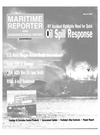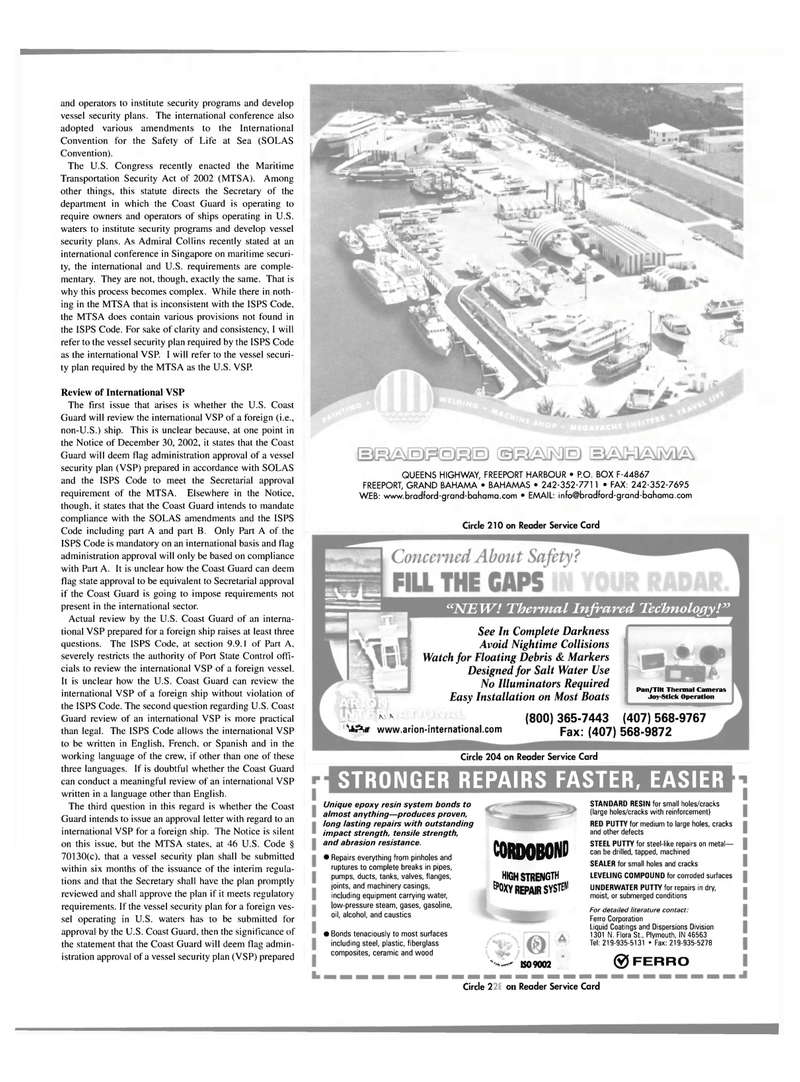
Page 19: of Maritime Reporter Magazine (March 2003)
Read this page in Pdf, Flash or Html5 edition of March 2003 Maritime Reporter Magazine
and operators to institute security programs and develop vessel security plans. The international conference also adopted various amendments to the International
Convention for the Safety of Life at Sea (SOLAS
Convention).
The U.S. Congress recently enacted the Maritime
Transportation Security Act of 2002 (MTSA). Among other things, this statute directs the Secretary of the department in which the Coast Guard is operating to require owners and operators of ships operating in U.S. waters to institute security programs and develop vessel security plans. As Admiral Collins recently stated at an international conference in Singapore on maritime securi- ty, the international and U.S. requirements are comple- mentary. They are not, though, exactly the same. That is why this process becomes complex. While there in noth- ing in the MTSA that is inconsistent with the ISPS Code, the MTSA does contain various provisions not found in the ISPS Code. For sake of clarity and consistency, I will refer to the vessel security plan required by the ISPS Code as the international VSP. I will refer to the vessel securi- ty plan required by the MTSA as the U.S. VSP.
Review of International VSP
The first issue that arises is whether the U.S. Coast
Guard will review the international VSP of a foreign (i.e., non-U.S.) ship. This is unclear because, at one point in the Notice of December 30, 2002, it states that the Coast
Guard will deem flag administration approval of a vessel security plan (VSP) prepared in accordance with SOLAS and the ISPS Code to meet the Secretarial approval requirement of the MTSA. Elsewhere in the Notice, though, it states that the Coast Guard intends to mandate compliance with the SOLAS amendments and the ISPS
Code including part A and part B. Only Part A of the
ISPS Code is mandatory on an international basis and (lag administration approval will only be based on compliance with Part A. It is unclear how the Coast Guard can deem flag state approval to be equivalent to Secretarial approval if the Coast Guard is going to impose requirements not present in the international sector.
Actual review by the U.S. Coast Guard of an interna- tional VSP prepared for a foreign ship raises at least three questions. The ISPS Code, at section 9.9.1 of Part A. severely restricts the authority of Port State Control offi- cials to review the international VSP of a foreign vessel.
It is unclear how the U.S. Coast Guard can review the international VSP of a foreign ship without violation of the ISPS Code. The second question regarding U.S. Coast
Guard review of an international VSP is more practical than legal. The ISPS Code allows the international VSP to be written in English, French, or Spanish and in the working language of the crew, if other than one of these three languages. If is doubtful whether the Coast Guard can conduct a meaningful review of an international VSP written in a language other than English.
The third question in this regard is whether the Coast
Guard intends to issue an approval letter with regard to an international VSP for a foreign ship. The Notice is silent on this issue, but the MTSA states, at 46 U.S. Code § 70130(c). that a vessel security plan shall be submitted within six months of the issuance of the interim regula- tions and that the Secretary shall have the plan promptly reviewed and shall approve the plan if it meets regulatory requirements. If the vessel security plan for a foreign ves- sel operating in U.S. waters has to be submitted for approval by the U.S. Coast Guard, then the significance of the statement that the Coast Guard will deem flag admin- istration approval of a vessel security plan (VSP) prepared
QUEENS HIGHWAY, FREEPORT HARBOUR • P.O. BOX F-44867
FREEPORT, GRAND BAHAMA • BAHAMAS • 242-352-7711 • FAX: 242-352-7695
WEB: www.bradford-grand-bahama.com • EMAIL: [email protected]
Circle 210 on Reader Service Card "NEW! Thermal Infrared Technology!"
I S f f&jff
JULK
WWW
See In Complete Darkness
Avoid Nightime Collisions
Watch for Floating Debris & Markers
Designed for Salt Water Use
No Illuminators Required
Easy Installation on Most Boats (800) 365-7443 (407) 568-9767 .arion-international.com pax: (497) 568-9872
Circle 204 on Reader Service Card
Pan/Tilt Thermal Cameras
Joy-Stick Operation
STRONGER REPAIRS FASTER, EASIER
Unique epoxy resin system bonds to almost anything—produces proven, long lasting repairs with outstanding impact strength, tensile strength, and abrasion resistance. • Repairs everything from pinholes and ruptures to complete breaks in pipes, pumps, ducts, tanks, valves, flanges, joints, and machinery casings, including eguipment carrying water, low-pressure steam, gases, gasoline, oil, alcohol, and caustics • Bonds tenaciously to most surfaces including steel, plastic, fiberglass composites, ceramic and wood
CORDOBOND f HIGH STRENGTH ,
Ep0XY REPAIR SYSTEM
STANDARD RESIN for small holes/cracks (large holes/cracks with reinforcement)
RED PUTTY for medium to large holes, cracks and other defects
STEEL PUTTY for steel-like repairs on metal— can be drilled, tapped, machined
SEALER for small holes and cracks
LEVELING COMPOUND for corroded surfaces
UNDERWATER PUTTY for repairs in dry, moist, or submerged conditions
For detailed literature contact:
Ferro Corporation
Liquid Coatings and Dispersions Division 1301 N. Flora St., Plymouth, ll\l 46563
Tel: 219-935-5131 • Fax: 219-935-5278
V—* ISO 9002 ® FERRO
MEOAYACHt
Circle 245 on Reader Service Card

 18
18

 20
20
